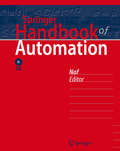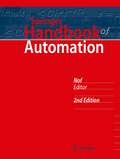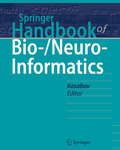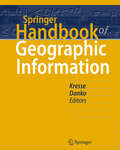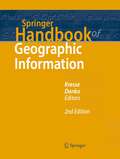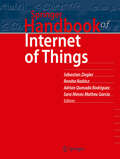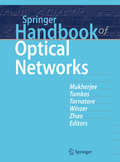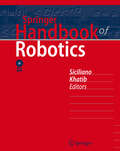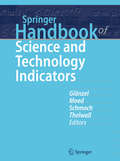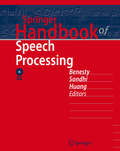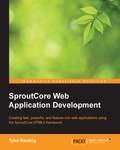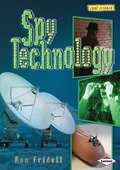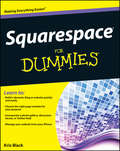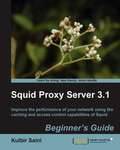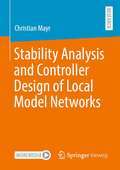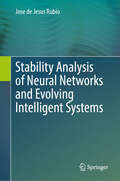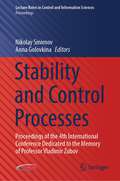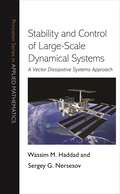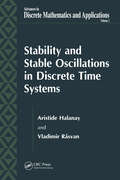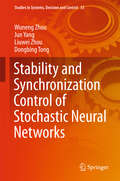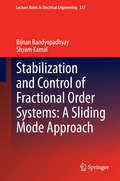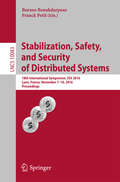- Table View
- List View
Springer Handbook of Automation
by Shimon Y. NofThis handbook incorporates new developments in automation. It also presents a widespread and well-structured conglomeration of new emerging application areas, such as medical systems and health, transportation, security and maintenance, service, construction and retail as well as production or logistics. The handbook is not only an ideal resource for automation experts but also for people new to this expanding field.
Springer Handbook of Automation (Springer Handbooks)
by Shimon Y. NofThis handbook incorporates new developments in automation. It also presents a widespread and well-structured conglomeration of new emerging application areas, such as medical systems and health, transportation, security and maintenance, service, construction and retail as well as production or logistics. The handbook is not only an ideal resource for automation experts but also for people new to this expanding field.
Springer Handbook of Bio-/Neuroinformatics
by Nikola KasabovThe Springer Handbook of Bio-/Neuro-Informatics is the first published book in one volume that explains together the basics and the state-of-the-art of two major science disciplines in their interaction and mutual relationship, namely: information sciences, bioinformatics and neuroinformatics. Bioinformatics is the area of science which is concerned with the information processes in biology and the development and applications of methods, tools and systems for storing and processing of biological information thus facilitating new knowledge discovery. Neuroinformatics is the area of science which is concerned with the information processes in biology and the development and applications of methods, tools and systems for storing and processing of biological information thus facilitating new knowledge discovery. The text contains 62 chapters organized in 12 parts, 6 of them covering topics from information science and bioinformatics, and 6 cover topics from information science and neuroinformatics. Each chapter consists of three main sections: introduction to the subject area, presentation of methods and advanced and future developments. The Springer Handbook of Bio-/Neuroinformatics can be used as both a textbook and as a reference for postgraduate study and advanced research in these areas. The target audience includes students, scientists, and practitioners from the areas of information, biological and neurosciences. With Forewords by Shun-ichi Amari of the Brain Science Institute, RIKEN, Saitama and Karlheinz Meier of the University of Heidelberg, Kirchhoff-Institute of Physics and Co-Director of the Human Brain Project.
Springer Handbook of Geographic Information
by Wolfgang Kresse David M. DankoComputer science provides a powerful tool that was virtually unknown three generations ago. Some of the classical fields of knowledge are geodesy (surveying), cartography, and geography. Electronics have revolutionized geodetic methods. Cartography has faced the dominance of the computer that results in simplified cartographic products. All three fields make use of basic components such as the Internet and databases. The Springer Handbook of Geographic Information is organized in three parts, Basics, Geographic Information and Applications. Some parts of the basics belong to the larger field of computer science. However, the reader gets a comprehensive view on geographic information because the topics selected from computer science have a close relation to geographic information. The Springer Handbook of Geographic Information is written for scientists at universities and industry as well as advanced and PhD students.
Springer Handbook of Geographic Information (Springer Handbooks)
by Wolfgang Kresse David DankoThis handbook provides an exhaustive, one-stop reference and a state-of-the-art description of geographic information and its use. This new, substantially updated edition presents a complete and rigorous overview of the fundamentals, methods and applications of the multidisciplinary field of geographic information systems. Designed to be a useful and readable desk reference book, but also prepared in various electronic formats, this title allows fast yet comprehensive review and easy retrieval of essential reliable key information. The Springer Handbook of Geographic Information is divided into three parts. Part A, Basics and Computer Science, provides an overview on the fundamentals, including descriptions of databases and encoding of geographic information. It also covers the underlying mathematical and statistics methods and modeling. A new chapter exemplifies the emerging use and analysis of big data in a geographic context. Part B offers rigorous descriptions of gathering, processing and coding of geographic information in a standardized way to allow interoperable use in a variety of systems; from traditional methods such as geodesy and surveying to state-of-the-art remote sensing and photogrammetry; from cartography to geospatial web services. Discussions on geosemantic interoperability and security of open distributed geospatial information systems complete the comprehensive coverage. The final part describes a wide array of applications in science, industry and society at large, such as agriculture, defense, transportation, energy and utilities, health and human services. The part is enhanced by new chapters on smart cities and building information modeling, as well as a complete overview of the currently available open-source geographic information systems. Using standardized international terminology, in accordance with ISO/TC 211 and INSPIRE, this handbook facilitates collaboration between different disciplines and is a must have for practitioners and new comers in industry and academia.
Springer Handbook of Internet of Things (Springer Handbooks)
by Sébastien Ziegler Adrian Quesada Rodriguez Renáta Radócz Sara Nieves Matheu GarciaThis handbook is an authoritative, comprehensive reference on Internet of Things, written for practitioners, researchers, and students around the world. This book provides a definitive single point of reference material for all those interested to find out information about the basic technologies and approaches that are used to design and deploy IoT applications across a vast variety of different application fields spanning from smart buildings, smart cities, smart factories, smart farming, building automation, connected vehicles, and machine to machine communication. The book is divided into ten parts, each edited by top experts in the field. The parts include: IoT Basics, IoT Hardware and Components, Architecture and Reference Models, IoT Networks, Standards Overview, IoT Security and Privacy, From Data to Knowledge and Intelligence, Application Domains, Testbeds and Deployment, and End-User Engagement. The contributors are leading authorities in the fields of engineering and represent academia, industry, and international government and regulatory agencies.
Springer Handbook of Optical Networks (Springer Handbooks)
by Ioannis Tomkos Massimo Tornatore Yongli Zhao Biswanath Mukherjee Peter WinzerThis handbook is an authoritative, comprehensive reference on optical networks, the backbone of today’s communication and information society. The book reviews the many underlying technologies that enable the global optical communications infrastructure, but also explains current research trends targeted towards continued capacity scaling and enhanced networking flexibility in support of an unabated traffic growth fueled by ever-emerging new applications. The book is divided into four parts: Optical Subsystems for Transmission and Switching, Core Networks, Datacenter and Super-Computer Networking, and Optical Access and Wireless Networks. Each chapter is written by world-renown experts that represent academia, industry, and international government and regulatory agencies. Every chapter provides a complete picture of its field, from entry-level information to a snapshot of the respective state-of-the-art technologies to emerging research trends, providing something useful for the novice who wants to get familiar with the field to the expert who wants to get a concise view of future trends.
Springer Handbook of Robotics
by Oussama Khatib Bruno SicilianoWith the science of robotics undergoing a major transformation just now, Springer's new, authoritative handbook on the subject couldn't have come at a better time. Having broken free from its origins in industry, robotics has been rapidly expanding into the challenging terrain of unstructured environments. Unlike other handbooks that focus on industrial applications, the Springer Handbook of Robotics incorporates these new developments. Just like all Springer Handbooks, it is utterly comprehensive, edited by internationally renowned experts, and replete with contributions from leading researchers from around the world. The handbook is an ideal resource for robotics experts but also for people new to this expanding field.
Springer Handbook of Science and Technology Indicators (Springer Handbooks)
by Ulrich Schmoch Henk F. Moed Mike Thelwall Wolfgang GlänzelThis handbook presents the state of the art of quantitative methods and models to understand and assess the science and technology system. Focusing on various aspects of the development and application of indicators derived from data on scholarly publications, patents and electronic communications, the individual chapters, written by leading experts, discuss theoretical and methodological issues, illustrate applications, highlight their policy context and relevance, and point to future research directions.A substantial portion of the book is dedicated to detailed descriptions and analyses of data sources, presenting both traditional and advanced approaches. It addresses the main bibliographic metrics and indexes, such as the journal impact factor and the h-index, as well as altmetric and webometric indicators and science mapping techniques on different levels of aggregation and in the context of their value for the assessment of research performance as well as their impact on research policy and society. It also presents and critically discusses various national research evaluation systems.Complementing the sections reflecting on the science system, the technology section includes multiple chapters that explain different aspects of patent statistics, patent classification and database search methods to retrieve patent-related information. In addition, it examines the relevance of trademarks and standards as additional technological indicators.The Springer Handbook of Science and Technology Indicators is an invaluable resource for practitioners, scientists and policy makers wanting a systematic and thorough analysis of the potential and limitations of the various approaches to assess research and research performance.
Springer Handbook of Speech Processing
by M. M. Sondhi Jacob Benesty Yiteng HuangThis handbook plays a fundamental role in sustainable progress in speech research and development. With an accessible format and with accompanying DVD-Rom, it targets three categories of readers: graduate students, professors and active researchers in academia, and engineers in industry who need to understand or implement some specific algorithms for their speech-related products. It is a superb source of application-oriented, authoritative and comprehensive information about these technologies, this work combines the established knowledge derived from research in such fast evolving disciplines as Signal Processing and Communications, Acoustics, Computer Science and Linguistics.
SproutCore Web Application Development
by Tyler KeatingWritten as a practical, step-by-step tutorial, Creating HTML5 Apps with SproutCore is full of engaging examples to help you learn in a practical context.This book is for any person looking to write software for the Web or already writing software for the Web. Whether your background is in web development or in software development, Creating HTML5 Apps with SproutCore will help you expand your skills so that you will be ready to apply the software development principles in the web development space.
Spy Technology (Cool Science Ser.)
by Ron FridellStealing secrets is a very old job. Spies from Europe set out to steal a precious secret from China about 1,500 years ago. At that time, the Chinese were making beautiful silk fabric. They created it from the cocoons of silkworms. No one else knew how to make it.
Squarespace 6 For Dummies
by Kris BlackBuild your own blog, website, or portfolio with SquarespaceSquarespace lets you create visually rich web pages with any configuration of text, images, or blocks you wish, just by dragging and dropping. Even if you've been using earlier versions of Squarespace, the features in version 6 will amaze you - and bring you straight to this must-have guide for practical information! If you're a do-it-yourself website builder, get up to speed fast on all the next-generation Squarespace tools, including cool new features for mobile sites, SEO, social networks, and more. Brings you up to speed on Squarespace 6 and its revolutionary LayoutEngine tool for building visually-rich web pagesDeciphers the very latest features for page-building in today's markets, including mobile, social media, and using SEODelves into using auto-publish for social networks, using built-in mobile websites, syncing with social networks, gathering real-time statistics, managing your site from your smartphone or mobile device, and much moreCovers the essentials, such as using templates, drag-and-drop image uploads, image-editing with Aviary, and using Page Builder to create, share, and reblog contentBuild awesome, professional websites for your business in no time with Squarespace 6 For Dummies.
Squarespace For Dummies
by Josh Kill Kris BlackDiscover how to build your own blog, website, or portfolio with Squarespace! Squarespace is a fast-growing all-in-one solution for creating and maintaining a blog, website, or portfolio that allows you to drag and drop various site elements and manage your finished product on the free Squarespace iPhone application. In this fun and friendly 224-page ebook, Squarespace For Dummies helps you discover the variety of modules to choose from, including blogs, maps, social network integration, HTML code blocks, photo galleries, and more. Packed with valuable information on how to maximize your website and the visitor experience, this guide offers tips for installing widgets, adding new widgets from third parties, and customization instructions. The author explains how Squarespace offers you the ability to use real-time visitor analytics, page rank tracking, and more. Examines the possibilities and potential of Squarespace, a publishing platform for building and maintaining a website Zeroes in on the various modules that you can choose from, including blogs, social network integration, photo galleries, and more Includes advice for getting the most out of your Squarespace website Squarespace For Dummies will get you started building your own website in no time!
Squeaky Clean Topology in Blender: Create accurate deformations and optimized geometry for characters and hard surface models
by Pablo Deeleman Michael SteppigA comprehensive introduction to 3D modeling, from the fundamental ideas of topology to in-depth examples that will help you take your projects to the next levelKey FeaturesOvercome complex topology problems while working through projectsLearn to topologize quad-based and non-quad-based meshes with step-by-step examplesOptimize your models by reducing the triangle count to improve performanceBook DescriptionThis book is an introduction to modeling and an in-depth look at topology in Blender, written by a Blender topology specialist with years of experience with the software. As you progress through its chapters, you'll conquer the basics of quad-based topology using triangles and Ngons, and learn best practices and things to avoid while modeling and retopologizing. The pages are full of illustrations and examples with in-depth explanations that showcase each step in an easy-to-follow format.Squeaky Clean Topology in Blender starts by introducing you to the user interface and navigation. It then goes through an overview of the modeling techniques and hotkeys that will be necessary to understand the examples. With the modeling basics out of the way, the next stop on our journey is topology. Working through projects like a character and a sci-fi blaster, the book will illustrate and work through complex topology problems, and present solutions to those problems. These examples focus on deforming character models, non-deforming hard surface models, and optimizing these models by reducing the triangle count.By the end of this book, you will be able to identify the general flow of a shape's topology, identify and solve issues in your topology, and come out with a model ready for UV unwrapping, materials, and rigging.What you will learnIdentify the general flow of a model's topology, and what might cause issuesUnderstand the topology of a character, and the joints that they make upHandle non-quad based topologyLay out your meshes for UV seamsExplore and use hotkeys to get things done fasterOptimize models for a reduced triangle countWho this book is forThis book is for character modelers, sculptors, poly modelers, and hard surface modelers. Whether you're looking for an introduction to modeling, optimizing high poly or sculpted models, or just a deeper dive into the subject of topology, this book will walk you through the topology workflow from beginning to end.
Squid Proxy Server 3.1: Beginner's Guide
by Kulbir SainiPart of Packt's Beginner's Guide Series, this book has lots of screenshots and step-by-step instructions to help you get to grips with the techniques as quickly as possible. Each chapter is dedicated to a different aspect of the Squid proxy server, so you will have a thorough understanding of how everything works and how it is connected by the end of the book. If you are a Linux or Unix system administrator and you want to enhance the performance of your network or you are a web developer and want to enhance the performance of your website, this book is for you. You are expected to have some basic knowledge of networking concepts, but may not have used caching systems or proxy servers before now.
Squid: The Definitive Guide
by Duane WesselsSquid is the most popular Web caching software in use today, and it works on a variety of platforms including Linux, FreeBSD, and Windows. Squid improves network performance by reducing the amount of bandwidth used when surfing the Web. It makes web pages load faster and can even reduce the load on your web server. By caching and reusing popular web content, Squid allows you to get by with smaller network connections. It also protects the host on your internal network by acting as a firewall and proxying your internal web traffic. You can use Squid to collect statistics about the traffic on your network, prevent users from visiting inappropriate web sites at work or school, ensure that only authorized users can surf the Internet, and enhance your privacy by filtering sensitive information from web requests. Companies, schools, libraries, and organizations that use web-caching proxies can look forward to a multitude of benefits.Written by Duane Wessels, the creator of Squid, Squid: The Definitive Guide will help you configure and tune Squid for your particular situation. Newcomers to Squid will learn how to download, compile, and install code. Seasoned users of Squid will be interested in the later chapters, which tackle advanced topics such as high-performance storage options, rewriting requests, HTTP server acceleration, monitoring, debugging, and troubleshooting Squid.Topics covered include:Compiling and installing SquidRunning SquidUsing Squid's sophisticated access controlsTuning disk storage for optimal performanceConfiguring your operating system for HTTP interceptionForwarding Requests to other web cachesUsing redirectors to rewrite user requestsMonitoring Squid with the cache manager and SNMPUsing Squid to accelerate and protect HTTP serversManaging bandwidth consumption with Delay Pools
Stability Analysis and Controller Design of Local Model Networks
by Christian MayrThis book treats various methods for stability analysis and controller design of local model networks (LMNs). LMNs have proved to be a powerful tool in nonlinear dynamic system identification. Their system architecture is more suitable for controller design compared to alternative approximation methods. The main advantage is that linear controller design methods can be, at least locally, applied and combined with nonlinear optimization to calibrate stable state feedback as well as PID controller. The calibration of stable state-feedback controllers is based on the closed loop stability analysis methods. Here, global LMIs (Linear Matrix Inequalities) can be derived and numerically solved. For LMN based nonlinear PID controllers deriving global LMIs is not possible. Thus, two approaches are treated in this book. The first approach works iteratively to get LMIs in each iteration step. The second approach uses a genetic algorithm to determine the PID controller parameters where for each individual the stability is checked. It allows simultaneous enhancement of (competing) optimization criteria.
Stability Analysis of Neural Networks and Evolving Intelligent Systems
by Jose de RubioThis book explores the stability analysis of neural networks and evolving intelligent systems, focusing on their ability to adapt to changing environments. It differentiates between neural networks, which have a static structure and dynamic parameter learning, and evolving intelligent systems, where both structure and parameters are dynamic. A key concern addressed is ensuring the stability of these systems, as instability can lead to damage or accidents in online applications. Stability Analysis of Neural Networks and Evolving Intelligent Systems emphasizes that stable algorithms used in these systems must be compact, effective, and stable. The book is divided into two parts: the first five chapters cover stability analysis of neural networks, while the latter five chapters explore stability analysis of evolving intelligent systems. The Lyapunov method is the primary tool used for these analyses. Neural networks are applied to various modeling and prediction tasks, including warehouse load distribution, wind turbine behavior, crude oil blending, and beetle population dynamics. Evolving intelligent systems are applied to modeling brain and eye signals, nonlinear systems with dead-zone input, and the Box Jenkins furnace. Each chapter introduces specific techniques and algorithms, such as a backpropagation algorithm with a time-varying rate for neural networks, analytic neural network models for wind turbines, and self-organizing fuzzy modified least square networks (SOFMLS) for evolving systems. The book also addresses challenges like incomplete data and big data learning, proposing hybrid methods and modified algorithms to improve performance and stability. The effectiveness of the proposed techniques is verified through simulations and comparisons with existing methods.
Stability and Control Processes: Proceedings of the 4th International Conference Dedicated to the Memory of Professor Vladimir Zubov (Lecture Notes in Control and Information Sciences - Proceedings)
by Nikolay Smirnov Anna GolovkinaThe proceedings of the 4th Stability and Control Processes Conference are focused on modern applied mathematics, stability theory, and control processes. The conference was held in recognition of the 90th birthday of Professor Vladimir Ivanovich Zubov (1930–2000).This selection of papers reflects the wide-ranging nature of V. I. Zubov’s work, which included contributions to the development of the qualitative theory of differential equations, the theory of rigid body motion, optimal control theory, and the theory of electromagnetic fields. It helps to advance many aspects of the theory of control systems, including questions of motion stability, nonlinear oscillations in control systems, navigation and reliability of control devices, vibration theory, and quantization of orbits. The disparate applications covered by the book – in mechanical systems, game theory, solid-state physics, socio-economic systems and medical and biological systems, control automata and navigation – are developments from Professor Zubov’s in-depth studies on the theory of stability of motion, the theory of automatic control and the theory of the motions of optimal processes. Stability and Control Processes presents research continuing the legacy of V. I. Zubov and updates it with sections focused on intelligence-based control. These proceedings will be of interest to academics, professionals working in industry and researchers alike.
Stability and Control of Large-Scale Dynamical Systems: A Vector Dissipative Systems Approach (Princeton Series in Applied Mathematics #41)
by Sergey G. Nersesov Wassim M. HaddadModern complex large-scale dynamical systems exist in virtually every aspect of science and engineering, and are associated with a wide variety of physical, technological, environmental, and social phenomena, including aerospace, power, communications, and network systems, to name just a few. This book develops a general stability analysis and control design framework for nonlinear large-scale interconnected dynamical systems, and presents the most complete treatment on vector Lyapunov function methods, vector dissipativity theory, and decentralized control architectures. Large-scale dynamical systems are strongly interconnected and consist of interacting subsystems exchanging matter, energy, or information with the environment. The sheer size, or dimensionality, of these systems necessitates decentralized analysis and control system synthesis methods for their analysis and design. Written in a theorem-proof format with examples to illustrate new concepts, this book addresses continuous-time, discrete-time, and hybrid large-scale systems. It develops finite-time stability and finite-time decentralized stabilization, thermodynamic modeling, maximum entropy control, and energy-based decentralized control. This book will interest applied mathematicians, dynamical systems theorists, control theorists, and engineers, and anyone seeking a fundamental and comprehensive understanding of large-scale interconnected dynamical systems and control.
Stability and Stable Oscillations in Discrete Time Systems
by Aristide Halanay Vladimir RasvanThe expertise of a professional mathmatician and a theoretical engineer provides a fresh perspective of stability and stable oscillations. The current state of affairs in stability theory, absolute stability of control systems, and stable oscillations of both periodic and almost periodic discrete systems is presented, including many applications in
Stability and Synchronization Control of Stochastic Neural Networks
by Jun Yang Wuneng Zhou Liuwei Zhou Dongbing TongThis book reports on the latest findings in the study of Stochastic Neural Networks (SNN). The book collects the novel model of the disturbance driven by Levy process, the research method of M-matrix, and the adaptive control method of the SNN in the context of stability and synchronization control. The book will be of interest to university researchers, graduate students in control science and engineering and neural networks who wish to learn the core principles, methods, algorithms and applications of SNN.
Stabilization and Control of Fractional Order Systems: A Sliding Mode Approach
by Bijnan Bandyopadhyay Shyam KamalIn the last two decades fractional differential equations have been used more frequently in physics, signal processing, fluid mechanics, viscoelasticity, mathematical biology, electro chemistry and many others. It opens a new and more realistic way to capture memory dependent phenomena and irregularities inside the systems by using more sophisticated mathematical analysis. This monograph is based on the authors' work on stabilization and control design for continuous and discrete fractional order systems. The initial two chapters and some parts of the third chapter are written in tutorial fashion, presenting all the basic concepts of fractional order system and a brief overview of sliding mode control of fractional order systems. The other parts contain deal with robust finite time stability of fractional order systems, integral sliding mode control of fractional order systems, co-operative control of multi-agent systems modeled as fractional differential equation, robust stabilization of discrete fractional order systems, high performance control using soft variable structure control and contraction analysis by integer and fractional order infinitesimal variations.
Stabilization, Safety, and Security of Distributed Systems
by Borzoo Bonakdarpour Franck PetitThis book constitutes the refereed proceedings of the 11th International Symposium on Stabilization, Safety, and Security of Distributed Systems, SSS 2009, held in Lyon, France, in November 2009. The 49 revised full papers and 14 brief announcements presented together with three invited talks were carefully reviewed and selected from 126 submissions. The papers address all safety and security-related aspects of self-stabilizing systems in various areas. The most topics related to self-* systems. The special topics were alternative systems and models, autonomic computational science, cloud computing, embedded systems, fault-tolerance in distributed systems / dependability, formal methods in distributed systems, grid computing, mobility and dynamic networks, multicore computing, peer-to-peer systems, self-organizing systems, sensor networks, stabilization, and system safety and security.
